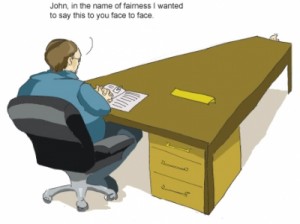A fair change manager
Experiencing fairness:
 John felt he was treated unfairly. He did not get the challenging job that he, in his own mind, thought belonged to him. His boss was not “a fair guy” in this matter. John believed he was the best man for this particular job, and it was also the work he wanted to do. This sense of unfairness did not ease, so John, in his annoyance, expressed his feelings to a couple of his friends and his wife. People he trusted then passed the story on to others, coloring, even changing it. Gossip, the biggest bug in all organizations, had broken loose.
John felt he was treated unfairly. He did not get the challenging job that he, in his own mind, thought belonged to him. His boss was not “a fair guy” in this matter. John believed he was the best man for this particular job, and it was also the work he wanted to do. This sense of unfairness did not ease, so John, in his annoyance, expressed his feelings to a couple of his friends and his wife. People he trusted then passed the story on to others, coloring, even changing it. Gossip, the biggest bug in all organizations, had broken loose.
For the person who feels genuinely mistreated, no one can dissuade otherwise. If his emotions include envy, misunderstanding, or other personal feelings, it does not change the intensity of the emotions underwent. Often it is hard to look at oneself in a mirror and admit to what s/he sees.
Changes in situations or organizations often cause many suspicions and fears to surface: what happens to my position; can I respond to challenges of the future? Justness, fairness, and experiencing their opposites are common for all organizational levels, as well as for directors, experts, and workers.
What actually is this fairness? To define it is only possible by using very general terms, for the exact definition will always meet contradictory opinions. This could be one reason why in a change or transformation situation it is so easy to forget fairness and focus on matters on which one can get a practical handle.
“To give everybody what belongs to him/her” (Plato on fairness)
How does the Change Manager know that a person lacks what should belong to him/her, or what is the foundation of this demand?
Fairness can be considered to well, among other things, from the following:
During a change the policies and processes are enforced using the same principles and valuesAny deviation from fair-play rules calls for immediate intervention and confrontation.The Change Manager and other decision makers will personally pay attention to fairness.The facts on which the decisions are based are correct and the influence of wrong information is rectified.People are treated ethically.People have the possibility to influence affairs (things) and to express their opinions.What can we achieve by being fair and just during a change situation?
It is easier to accept a decision different from own when a person trusts in a fair process to handle the matters. Possible conflicts regarding fairness can through cynicism and bitterness cause individuals to act openly or passively against decisions. Trust of the process helps in accepting decisions and in achieving peak performance. The unfairness experienced in the beginning of the change process has a greater effect on the acts of the employees than if felt later in the process.
Being as open as possible in all objectives and steps related to change, the Change Manager can ensure that the information in an organization is correct. This is achieved by constantly evaluating fairness and focusing on it from the very beginning. This is how one can cut unnecessary speculation based on partial information and gossip. I believe that paying attention to fairness early enough, our efforts will be rewarded.
